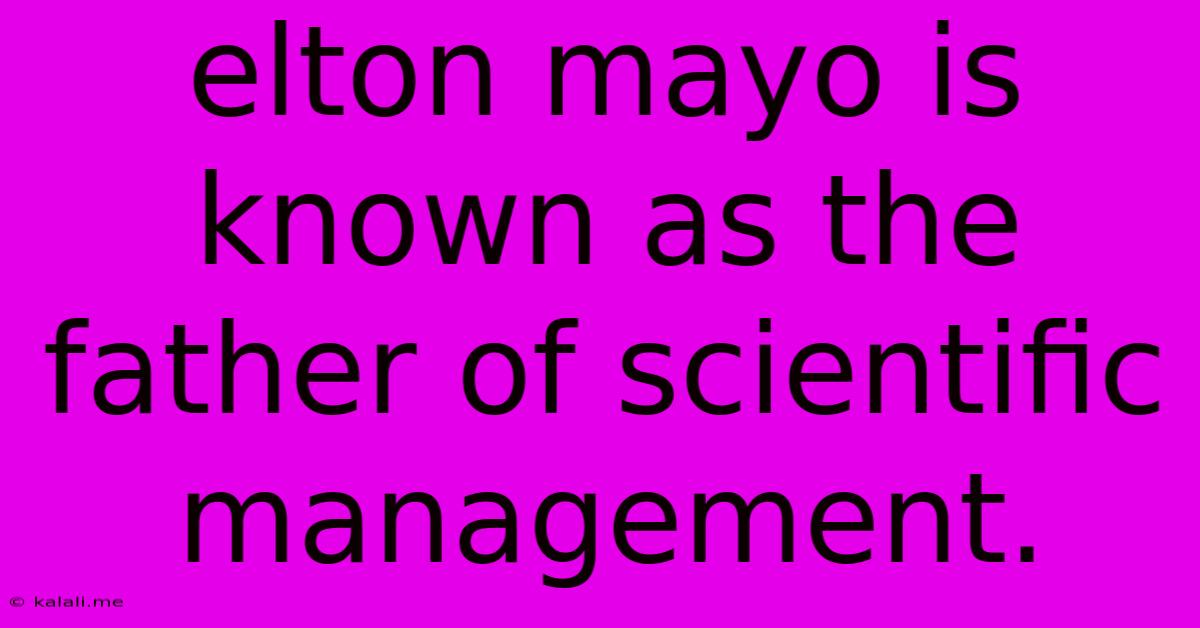Elton Mayo Is Known As The Father Of Scientific Management.
Kalali
Jun 14, 2025 · 3 min read

Table of Contents
Elton Mayo: Misunderstood Father of Human Relations, Not Scientific Management
Meta Description: While often mistakenly attributed, Elton Mayo's contributions revolutionized management theory through the Hawthorne Studies, focusing on human relations rather than the scientific management championed by Frederick Winslow Taylor. This article explores Mayo's legacy and its impact on modern management practices.
Elton Mayo is frequently, and incorrectly, labeled the "father of scientific management." This misconception stems from his significant influence on management theory, particularly through the Hawthorne Studies. However, the true father of scientific management is Frederick Winslow Taylor, whose principles focused on optimizing workflows through time-and-motion studies and standardized processes. Mayo's work, while groundbreaking, took a radically different approach.
The Hawthorne Studies: A Turning Point in Management Thinking
Mayo's fame rests primarily on his involvement in the Hawthorne Studies, conducted at the Western Electric Hawthorne Works in Chicago during the 1920s and 1930s. These experiments, initially designed to examine the impact of physical conditions on worker productivity (illumination levels, rest breaks, etc.), yielded unexpected results. The researchers discovered that social factors and group dynamics had a far greater influence on worker output than previously thought. Regardless of the changes in physical conditions, productivity often increased simply because the workers felt they were being observed and their opinions valued. This phenomenon became known as the Hawthorne effect.
Human Relations Movement: Mayo's True Legacy
The Hawthorne Studies marked the beginning of the human relations movement in management. This shift in focus emphasized the importance of employee morale, motivation, and social interaction in the workplace. Mayo's findings highlighted the need to consider the psychological and social needs of workers, moving away from the purely mechanistic view of scientific management. He argued that a sense of belonging and teamwork, along with effective communication and collaboration between management and employees, were critical for increased productivity and job satisfaction.
Distinguishing Mayo from Taylor: Key Differences
While both Mayo and Taylor aimed to improve workplace efficiency, their approaches differed significantly:
- Taylor's Scientific Management: Focused on optimizing individual worker tasks through scientific analysis, standardization, and specialization. Emphasis on efficiency and productivity through optimized workflows.
- Mayo's Human Relations Approach: Emphasized the importance of social factors, group dynamics, and employee well-being in improving productivity and job satisfaction. Focus on understanding human behavior in the workplace.
The Lasting Impact of Mayo's Work
Mayo's contributions, although not directly related to scientific management, had a profound and lasting impact on modern management practices. His emphasis on human relations paved the way for:
- Improved employee communication and feedback mechanisms.
- The development of participatory management styles.
- Increased attention to employee motivation and job satisfaction.
- The rise of organizational psychology and behavioral science in management.
Conclusion: Understanding Mayo's Place in Management History
While the misattribution persists, it's crucial to understand that Elton Mayo's work fundamentally shifted the landscape of management theory. He didn't invent scientific management; instead, he helped to broaden its scope, highlighting the crucial role of human interaction and social dynamics in the workplace. His legacy lies not in the realm of scientific management, but in the pioneering development of the human relations movement – a far more nuanced and ultimately, more effective approach to management in the long run. His research continues to inform modern management theories, emphasizing the importance of employee engagement, teamwork, and a holistic understanding of the human element within any organization.
Latest Posts
Latest Posts
-
What Is Considered The First Step When Conducting Experimental Research
Jun 14, 2025
-
How Many Factors Does 21 Have
Jun 14, 2025
-
Stress Strain Curve For Cast Iron
Jun 14, 2025
-
Which Of The Following Is An Abiotic Factor
Jun 14, 2025
-
What Process Destroys All Microbial Life Including Spores
Jun 14, 2025
Related Post
Thank you for visiting our website which covers about Elton Mayo Is Known As The Father Of Scientific Management. . We hope the information provided has been useful to you. Feel free to contact us if you have any questions or need further assistance. See you next time and don't miss to bookmark.